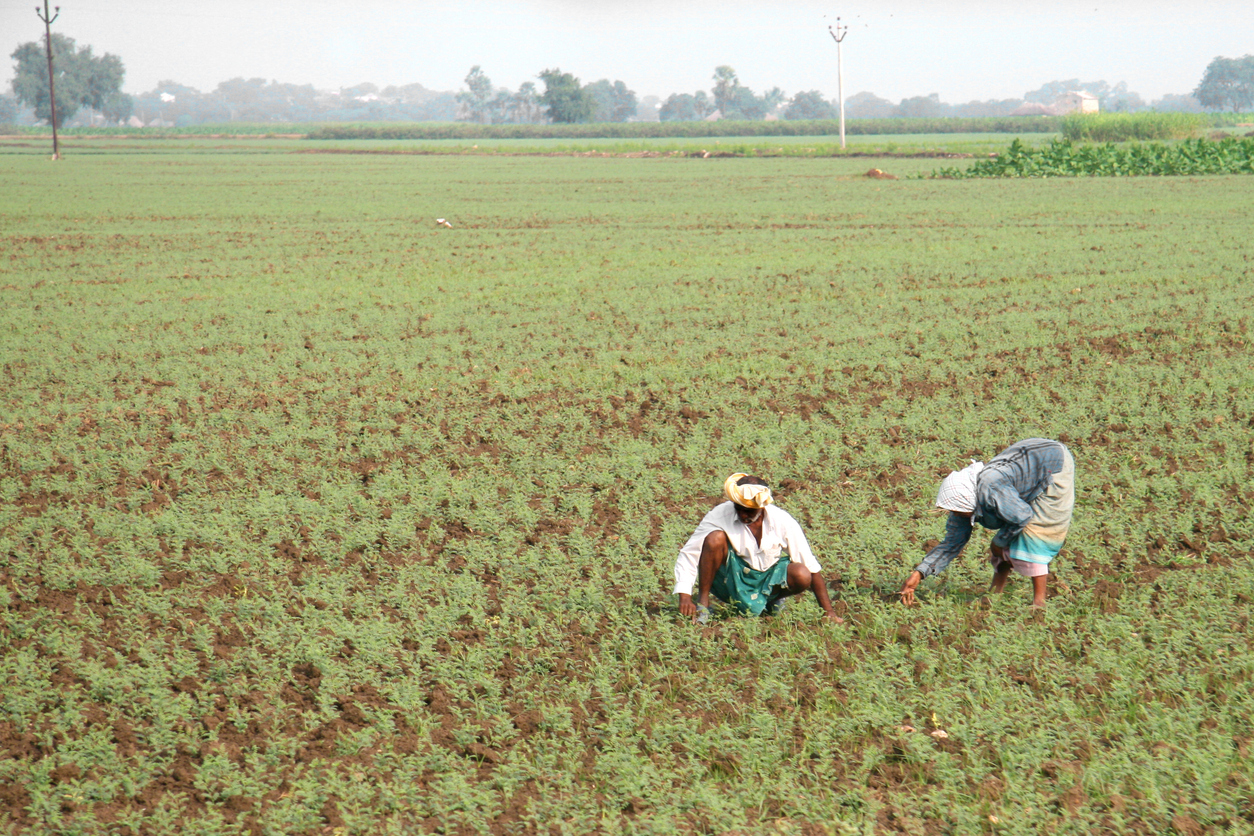Opposition parties accuse the ruling TDP of dragging its feet to benefit corporates. Meanwhile, farmers say their lives are stuck in limbo.
Published Sep 16, 2025 | 8:00 AM ⚊ Updated Sep 16, 2025 | 9:18 AM

Farmers at their farm in Andhra Pradesh (iStock)
Synopsis: Andhra Pradesh’s freehold land crisis persists as Revenue Minister Anagani Satyaprasad promises resolution by October. The Group of Ministers is addressing irregularities in 13.6 lakh acres, with 5.7 lakh acres wrongly freed under YSRCP’s rule. A resurvey aims to clear disputes, protect the poor, and ensure legal registrations, while tackling scams and delays that have left farmers in limbo.
Andhra Pradesh Revenue Minister Anagani Satyaprasad, speaking at the two day district collectors’ conference which began on Monday, 15 September, said that steps were being taken to resolve the free hold land issue by October.
The minister added, “The Group of Ministers (GoM) set up to look into the issue will take a final decision. Collectors have been asked to examine “22A dispute-free lands” and remove them from the prohibited list. They were also told to carry out the resurvey in a systematic way.”
The allegation against the previous YSRCP government was that it had granted “free hold rights” (ownership rights) for 13.6 lakh acres of assigned land to the beneficiaries who were in their possession and, under its guise, it had perpetrated large-scale land scams.
Assigned lands were originally allotted to landless poor families, often from Scheduled Castes and Scheduled Tribes. These lands came without ownership rights. The Andhra Pradesh Assigned Lands (Prohibition of Transfers) Act, 1977, barred sale or transfer. Beneficiaries could only cultivate the land and enjoy its proceeds.
According to official sources, the GoM has broadly decided to permit registrations of freehold lands once they are cleared of disputes. But lands with irregularities will be kept aside. The GoM is also considering a nominal fee when assignees sell land to people outside their social category. Action against errant officials is also on the table.
In 2023, the YSRCP government issued GO No. 5966, granting “freehold rights” to assignees holding land for more than 20 years. The aim, it said, was to give dignity, financial security, and access to loans. Nearly 13.6 lakh acres were removed from the prohibited list.
But when the NDA came to power in 2024, irregularities surfaced. The government found that 5.7 lakh acres had been freed in violation of rules. About 25,000 acres had already been registered, including 8,484 acres illegally removed under Section 22-A of the Registration Act.
Rules say only lands distributed to the poor 20 years earlier can be freed. Yet, during the YSRCP regime, it is alleged that 2.8 lakh acres were wrongly cleared. This included private lands, hill tracts, and 55,000 acres removed in violation of the 1977 Act.
Finance Minister Payyavula Keshav, who heads the GoM, recently admitted that there was delay. But he says the government is being careful. “We don’t want to hurt weaker sections. Small and marginal farmers will be spared. But suspicious cases will be looked into carefully. The government must also protect its own interests, such as land for infrastructure,” he said.
Revenue Minister Anagani Satyaprasad has made similar remarks. “The GoM has studied the issue for long hours. Our guiding principle is to protect the poor. The problems are many. We are moving slowly but steadily,” he said.
Meanwhile, the registration ban has now stretched into its second year. Now 13.6 lakh acres of land is caught in the freeze. What was promised as a dream of absolute ownership has become a nightmare of scams, delays, and political mudslinging.
The roots of the crisis go back decades. Successive governments assigned surplus and wastelands to the landless poor. The 1977 Act barred their sale, to prevent distress transactions and exploitation by moneylenders. For years, this held. But informal transfers were common, as the 2006 Koneru Ranga Rao report noted, linking weak enforcement to rising land disputes.
In July 2023, the Jagan Mohan Reddy government amended the Act, allowing freehold rights to the lands held for 20 years prior. Reddy hailed it as historic. “No other state has done this,” he said, calling it a step to restore dignity and empower the poor through ownership.
But critics had warned of misuse arguing that freehold rights undermined the purpose of land assignment. Complaints soon poured in about ineligible beneficiaries, fraudulent conversions, and even communal lands being registered as private property.
When Chandrababu Naidu took office in 2024, he moved quickly. On 10 August, his government halted all freehold registrations, citing Section 22-A violations. District committees were set up to re-verify records.
By March 2025, the state promised to resolve pending land issues in three months. But six months later, the freeze continues. Opposition parties accuse the government of dragging its feet to benefit corporates. Farmers say their lives are stuck in limbo.
Revenue Minister Satyaprasad, however, insisted a solution is close.
“We will resolve the issue by October. Genuine rights will be protected,” he said recently. For now, scrutiny continues on nearly 5 lakh acres. Around half may be pushed back into the prohibited list.
(Edited by Amit Vasudev)
